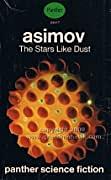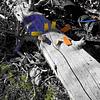Take a photo of a barcode or cover
3.5. As I’ve read a lot of Asimov lately this fits pretty consistently with his early work in the 1950’s. Not bad, not great- but above average. I like his later work a bit better- and you can definitely see his evolution, but it’s always a good read to dip into the early works.
adventurous
funny
relaxing
fast-paced
adventurous
mysterious
medium-paced
Plot or Character Driven:
Plot
Strong character development:
No
Loveable characters:
No
Diverse cast of characters:
No
Flaws of characters a main focus:
No
Lots of fun twists and turns but marred hy sexism and boring exposition throughout. Also the conceit of the document was so contemptible and exasperating that my eyes very nearly rolled right out of my head. No wonder Asimov called it his own least favourite work.
I love Isaac Asimov.
I've always enjoyed his novels and other fiction, but this is one of the best. And it's only his second published novel--a fact I found out after hearing the word spacionautics instead of astronautics. That, really, is my one criticism--I appreciate that Asimov coined the word 'robotics' but I'm glad spacionautics didn't stick around (I don't know if that was Asimov's word or if he borrowed it, but it's a jarring mix of modern English and Greek roots. Jarring for me, at least.
Other than that, I love the way that Asimov is playing with tropes, undermining tropes--some of which probably didn't exist yet. I especially noticed one about royalty. Modern fantasy, especially, has a tendency towards desportism; here's a frequent storyline. (Good) king is killed, or at least has his power usurped by -- relative, outsider, whoever. The good prince(ss) or maybe the former monarch themself, does everything in the power, gaining the help of new friends along the way, to restore their (benevolent) despotism. Yay monarch, boo democracy.
The Stars Like Dust is set up to do that, but, well, manages to suggest a very different ending (though perhaps the characters aren't convincing in this, but I didn't care)
He also shows, masterfully, how to insert sudden twists that, on review, make complete sense. He does it quite a few times. In fact the only twist that I caught before hand (and I caught it long before hand) was SPOILER ALERT
SPOILER ALERT the document that the main characters father had been looking for and that is brought out at the end. The document that would destroy the khans, but also themselves Ok, that's a minor lie, I thought it was going to be the US Declaration of Independence. It turned out to be the Constitution.
This almost strikes me as overly jingoistic (he is writing in the 50s), and tainted by the idea of spreading 'democracy' at any, undemocratic, price. This is at the beginning of the cold war.
On the other hand, this is the early fifties, an era of decolonization when countries that had been under the thumb of US allies like Britain and France (and in some cases the US themselves), were being given the chance set up democracy for themselves. I don't know if that's what Asimov was thinking, but it fits for me.
I've always enjoyed his novels and other fiction, but this is one of the best. And it's only his second published novel--a fact I found out after hearing the word spacionautics instead of astronautics. That, really, is my one criticism--I appreciate that Asimov coined the word 'robotics' but I'm glad spacionautics didn't stick around (I don't know if that was Asimov's word or if he borrowed it, but it's a jarring mix of modern English and Greek roots. Jarring for me, at least.
Other than that, I love the way that Asimov is playing with tropes, undermining tropes--some of which probably didn't exist yet. I especially noticed one about royalty. Modern fantasy, especially, has a tendency towards desportism; here's a frequent storyline. (Good) king is killed, or at least has his power usurped by -- relative, outsider, whoever. The good prince(ss) or maybe the former monarch themself, does everything in the power, gaining the help of new friends along the way, to restore their (benevolent) despotism. Yay monarch, boo democracy.
The Stars Like Dust is set up to do that, but, well, manages to suggest a very different ending (though perhaps the characters aren't convincing in this, but I didn't care)
He also shows, masterfully, how to insert sudden twists that, on review, make complete sense. He does it quite a few times. In fact the only twist that I caught before hand (and I caught it long before hand) was SPOILER ALERT
SPOILER ALERT the document that the main characters father had been looking for and that is brought out at the end. The document that would destroy the khans, but also themselves Ok, that's a minor lie, I thought it was going to be the US Declaration of Independence. It turned out to be the Constitution.
This almost strikes me as overly jingoistic (he is writing in the 50s), and tainted by the idea of spreading 'democracy' at any, undemocratic, price. This is at the beginning of the cold war.
On the other hand, this is the early fifties, an era of decolonization when countries that had been under the thumb of US allies like Britain and France (and in some cases the US themselves), were being given the chance set up democracy for themselves. I don't know if that's what Asimov was thinking, but it fits for me.
adventurous
dark
mysterious
tense
fast-paced
Plot or Character Driven:
A mix
Strong character development:
No
Loveable characters:
No
Diverse cast of characters:
Yes
Flaws of characters a main focus:
Yes
adventurous
hopeful
mysterious
medium-paced
I’m easily amused by plot twists, so I had moments of fun, and it’s still sf and still catchy to follow people in outer space trying to find hidden worlds, but I think that’s all…
The political background is sooo poor, the bad guys are called the Tyranni, the emperor is the khan (if you use historical elements to create your world, please do it properly, I don’t see any similiraties between the monghol nomadic khanat and this empire except that they are BAD GUYS), and SPOILER ALERT the weapon that will save the Galaxy is… the Constitution of the USA. I just laughed at these last words. I read in another review that it was the editor wish that Asimov put it in his book… that’s sad.
And it’s SO sexist. You can find in 1 star Nicholas review a few quotes. The only female character is a spoiled girl who can’t behave herself on a spaceship, who complains about the lack of space, who manipulates other men, and whenever she gets clever, she still fails and needs to be rescued by men. And of course a good part of what is written about her is about her physical cannonical beauty.
I was used to Asimov’s sexism but he managed to exceed my expectations here. I think I prefer a book like Foundation where there’s virtually no female character and you can just imagine some of these men as women…
The political background is sooo poor, the bad guys are called the Tyranni, the emperor is the khan (if you use historical elements to create your world, please do it properly, I don’t see any similiraties between the monghol nomadic khanat and this empire except that they are BAD GUYS), and SPOILER ALERT the weapon that will save the Galaxy is… the Constitution of the USA. I just laughed at these last words. I read in another review that it was the editor wish that Asimov put it in his book… that’s sad.
And it’s SO sexist. You can find in 1 star Nicholas review a few quotes. The only female character is a spoiled girl who can’t behave herself on a spaceship, who complains about the lack of space, who manipulates other men, and whenever she gets clever, she still fails and needs to be rescued by men. And of course a good part of what is written about her is about her physical cannonical beauty.
I was used to Asimov’s sexism but he managed to exceed my expectations here. I think I prefer a book like Foundation where there’s virtually no female character and you can just imagine some of these men as women…
funny
hopeful
medium-paced
Strong character development:
No
Diverse cast of characters:
Yes
Flaws of characters a main focus:
No
adventurous
tense
medium-paced
Plot or Character Driven:
Plot
Strong character development:
No
Loveable characters:
No
Diverse cast of characters:
No
Flaws of characters a main focus:
No
I read the Robot series & the Foundation series years ago, but had never gotten around to the Empire series. Now I am kicking myself. It was clever, fun, & just awesome. But then, it's by Asimov--of course it was.



